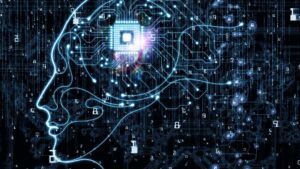Artificial intelligence (AI) has a rich and extensive history, marked by significant milestones and advancements that have shaped the field. From its earliest beginnings to the present day, AI has evolved to encompass various domains such as machine learning, deep learning, and natural language processing.
This article provides a comprehensive breakdown of the history of AI, including a timeline of innovations and key figures who have contributed to its development. Discover how AI has transformed over the years and the potential it holds for the future.
Introduction To Artificial Intelligence
Artificial Intelligence has a rich history, with significant milestones that have shaped its development over the years. From the first AI created at Stanford AI Lab to the mainstream use of Siri, Google Now, and Cortana, this comprehensive breakdown provides a timeline of innovations and advancements in the field.
Definition Of Artificial Intelligence
Artificial Intelligence, often abbreviated as AI, is a field of computer science that focuses on the development of intelligent machines that can mimic human cognitive functions. It involves the creation of algorithms and systems that enable machines to perform tasks that typically require human intelligence, such as problem-solving, decision making, speech recognition, and natural language understanding.
Importance Of Artificial Intelligence
The importance of Artificial Intelligence cannot be overstated in today’s digital age. AI has revolutionized various industries, including healthcare, finance, transportation, and entertainment. Here are some key reasons why AI is considered crucial:
- Automation: AI-powered systems can automate repetitive tasks, leading to increased productivity and efficiency. This allows human workers to focus on more complex and creative tasks.
- Data Analysis: AI algorithms can analyze vast amounts of data, uncovering valuable insights and patterns that may not be apparent to humans. This enables organizations to make data-driven decisions and improve their processes.
- Personalization: AI can analyze user behavior and preferences to deliver personalized recommendations, whether it’s in the form of product suggestions, content recommendations, or marketing campaigns. This enhances the user experience and increases customer satisfaction.
- Enhanced Accuracy: AI systems can perform tasks with a high degree of accuracy, often surpassing human capabilities. For example, AI-powered medical imaging systems can detect diseases and abnormalities with greater precision than human doctors.
- Efficient Problem Solving: AI algorithms can quickly analyze complex problems and generate solutions. This can be particularly useful in areas such as logistics planning, resource allocation, and risk assessment.
Overall, Artificial Intelligence has the potential to transform industries, improve decision-making processes, and enhance our daily lives in numerous ways. As technology continues to advance, AI is expected to play an increasingly significant role in shaping the future.

Credit: saiwa.ai
Early Beginnings Of Artificial Intelligence
Myths And Rumors Of Artificial Beings
AI has captured the imagination of people for centuries, leading to the creation of several myths and rumors surrounding artificial beings. In ancient Greek mythology, there were stories about mechanical men, called automatons, who could perform tasks with human-like precision. These tales sparked the idea that artificial beings could be created to mimic human intelligence.
During the Middle Ages, alchemists and philosophers attempted to create homunculi, small human-like creatures, through alchemical processes. Although these attempts were mostly based on mythology and fiction, they laid the foundation for the belief that artificial beings were possible.
As technology advanced, so did the rumors and speculation. In the 18th century, there were rumors of a chess-playing automaton called “The Turk,” which was later revealed to be a hoax. This incident further fueled the fascination with creating intelligent machines.
Alan Turing And The Turing Test
One of the pivotal moments in the early history of AI was the work of Alan Turing. In 1950, Turing proposed a test to determine if a machine could exhibit intelligent behavior indistinguishable from that of a human. This became known as the Turing Test.
The Turing Test involves a human evaluator interacting with a machine and a human through a computer terminal. If the evaluator cannot consistently differentiate between the machine and the human, then the machine is considered to have passed the test and exhibited human-like intelligence.
Turing’s test opened up new possibilities and set the stage for AI research and development. It sparked discussions about machine intelligence and the potential for creating machines that could emulate human thought processes.
Evolution Of Artificial Intelligence
Artificial Intelligence (AI) has come a long way since its inception, evolving over time to become one of the most transformative technologies of our era. From its early beginnings to the sophisticated systems we have today, the history of AI is filled with remarkable advancements and breakthroughs.
Advancements In Machine Learning
Machine Learning (ML) plays a crucial role in the evolution of AI. It is a subfield of AI that focuses on developing algorithms and statistical models that enable computers to learn and make predictions without being explicitly programmed. Over the years, ML has undergone significant advancements that have propelled AI to new heights.
Starting from the development of simple algorithms in the 1950s, ML has witnessed remarkable progress. Today, we have sophisticated ML techniques, such as supervised and unsupervised learning, reinforcement learning, and deep learning.
Progress In Deep Learning
Deep Learning is a subset of ML that focuses on building artificial neural networks with multiple layers to mimic the human brain’s ability to recognize patterns and make decisions. This revolutionary approach to AI has sparked numerous advancements in various domains.
Deep Learning algorithms, such as Convolutional Neural Networks (CNNs) and Recurrent Neural Networks (RNNs), have proven to be highly effective in tasks like image and speech recognition, natural language processing, and even playing complex games like Go.
Applications Of Artificial Intelligence
The applications of AI are vast and varied, ranging from virtual assistants like Siri and Alexa to autonomous vehicles, healthcare diagnostics, and fraud detection systems. With each passing year, AI continues to disrupt industries, revolutionizing the way we live, work, and interact with technology.
Today, AI is being used to predict customer preferences, personalize recommendations, optimize supply chains, automate manufacturing processes, and even assist in scientific research. The potential of AI seems limitless, and its impact on society is only expected to grow in the future.
In conclusion, the evolution of Artificial Intelligence has been driven by continuous advancements in Machine Learning and Deep Learning. These developments have paved the way for innovative applications that have the potential to transform various aspects of our lives. As we look to the future, the possibilities for AI are exciting and boundless.
Frequently Asked Questions For A Complete History Of Artificial Intelligence
What Is The Brief History Of Artificial Intelligence?
Artificial intelligence (AI) has a brief history filled with technological advancements. From the first AI created at Stanford AI Lab to the mainstream adoption of virtual assistants like Siri and Google Now, AI has made significant progress. It has evolved into various forms, including machine learning, deep learning, and natural language processing.
AI’s history continues to shape and influence the way we live and interact with technology.
What Is The History Of General Artificial Intelligence?
Artificial general intelligence has a rich history, from the creation of the first autonomous vehicle to the mainstream adoption of virtual assistants like Siri and Google Now. The development of AI has explored various types, including machine learning and deep learning.
Key milestones include advancements in pattern recognition and error reduction. Overall, the history of AI showcases continuous progress and innovation.
What Is The First Ai Of All Time?
The first AI of all time is widely recognized as the Logic Theorist, developed by Allen Newell and Herbert A. Simon in 1956.
Who Is The Father Of Ai?
The father of AI is John McCarthy.
Conclusion
Throughout history, the field of artificial intelligence (AI) has gone through an incredible roller coaster ride of successes and failures. From its humble beginnings in the 1950s to the present day, AI has evolved into a powerful technology that is reshaping various industries.
The timeline of AI innovations highlights the progress made in machine learning, deep learning, natural language processing, and more. As we navigate the future, the possibilities of AI are endless, and it will continue to revolutionize the way we live.
So, buckle up and get ready for an exciting journey into the history of artificial intelligence.




